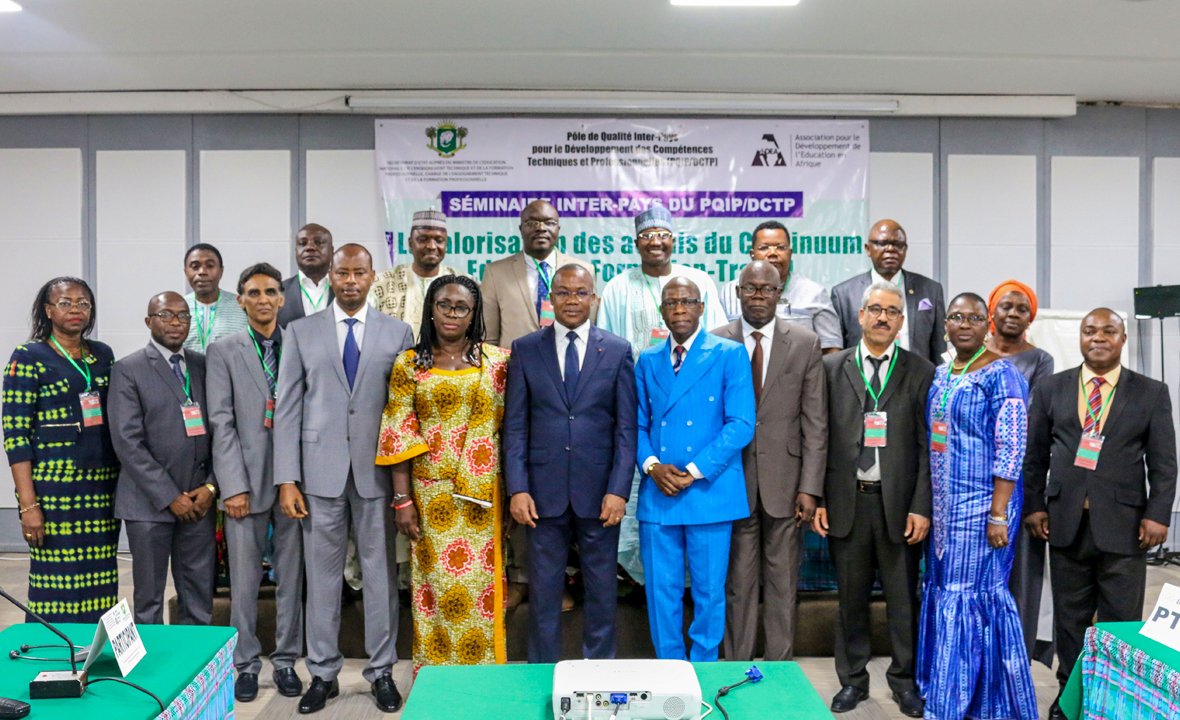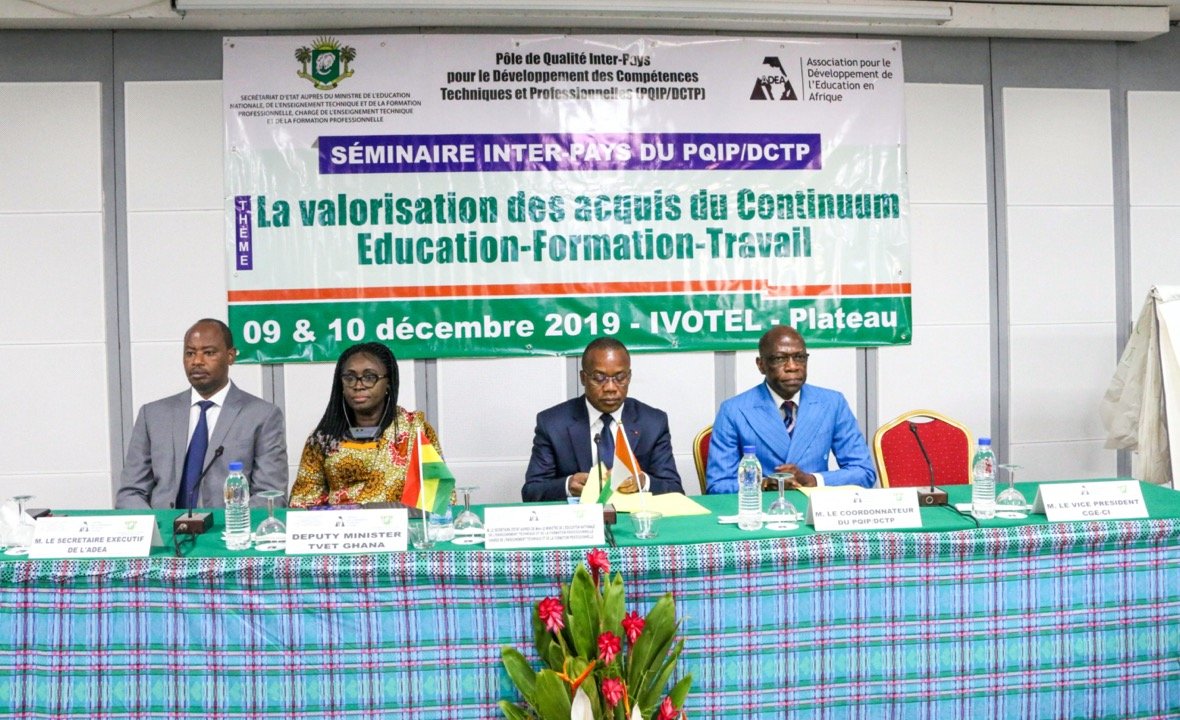ADEA and its ICQN-TVSD assess the Education-Training-Work continuum in Africa



Abidjan (Côte d’Ivoire) 17th December 2019 – The Inter-Country Quality Node on Technical and Vocational Skills Development (ICQN-TVSD) of the Association for the Development of Education in Africa (ADEA) organized from 9th to 10th December 2019 in Abidjan a continental workshop to promote and assess the achievements of the education-training-work continuum in Africa.
Under the co-chairmanship of Dr. Brice Kouassi, Secretary of State for the Ministry of National Education, Technical Education and Vocational Training of Côte d'Ivoire, and Ms. Gifty Twum Ampofo, Deputy Minister for Technical, Vocational Education and Training (TVET) of Ghana, the workshop brought together experts from several countries, namely Benin, Burkina Faso, Cameroon, Chad, Côte d'Ivoire, Democratic Republic of the Congo, Ghana, Liberia , Mauritius, Niger, Rwanda, Senegal, Tanzania, Togo, and Tunisia. Representatives from private sector, civil society as well as technical and financial partners (i.e. UNESCO, Swiss Development Cooperation, UEMOA, UNIDO, etc.) were also in attendance.
Mr. Amara Kamate, ICQN-TVSD Coordinator, after wishing the participants the traditional “Akwaba [1]”, recalled the objectives of the workshop and informed the participants that the meeting was part of the implementation of the ICQN-TVSD action plan and activities for 2014-2019.
In his speech, Mr. Albert Nsengiyumva, Executive Secretary of ADEA, first acknowledged the strong participation of the ICQN member countries in the workshop, before making a brief presentation of his Association which he considers as a platform to allow countries to exchange on different themes related to education, training and socio-professional integration of African youth in the world of work. "Education should no longer be linear and bridges between different subsystems should be fostered. The sharing of experiences and achievements by countries is essential to adapt education and training to the demand of the labor market", said Mr. Nsengiyumva. Moreover, he reiterated the availability of ADEA to support the implementation of the recommendations of the workshop.
Ms. Gifty Twum Ampofo, Deputy Minister for Technical, Vocational Education and Training of Ghana, in her speech, emphasized the importance linked to human capital development, because the linear process of the education system has limits that do not promote the preparation of the youth for the acquisition of the right skills necessary for their integration into the world of work. She also claimed for a change of mentality on the perception that we have of vocational training.
The aim of the seminar was to assess the achievements of the work started in 2017 to better enhance the role of alternative tools for the education-training-work continuum", explained Dr. Brice Kouassi, the Ivorian Secretary of State for National Education, Technical Education and Vocational Training during his official opening speech. In addition, he congratulated the ICQN-TVSD for the encouraging results as well as the tremendous work done for years before urging its members to continue their actions and research efforts. Lastly, he highlighted the experiences proposed by Côte d'Ivoire to offer all young people aged from 6 to 16 an education-training-work continuum within the framework of the national law on compulsory education.
The 2-day workshop enabled the country experts – through a critical analysis of the five continuum instruments [2] – to formulate the following main recommendations which aim to:
- Advocate for the inclusion of the continuum instruments in the established data collection systems;
- Initiate research on the factors of optimal efficiency and scaling of the continuum instruments;
- Organize an inter-country forum for the promoters of the various education-training-work instruments.
Technical and vocational training is key for African youth, but now it will be necessary for the countries and the main education actors to quickly pass from the discussion phase to the implementation one, as the Executive Secretary of ADEA reiterated in his speech.
For more information, please contact:
- Amara Kamate, ADEA’s ICQN-TVSD Coordinator, T. (+225) 20 33 54 77, E. amarakamate25@yahoo.fr
Media:
- Stefano De Cupis, Senior Communications Officer, ADEA, T. (+225) 20.26.42.61, E. s.decupis@afdb.org
About ADEA
The Association for the Development of Education in Africa (ADEA) is the voice of education in Africa and a key network of Education Ministries. It plays a significant role in the education space as a convener, knowledge creator and forum for policy dialogue, working through its Inter-Country Quality Nodes (ICQNs) and the Task Force on Education Management and Policy Support. ADEA contributes to the empowerment of African countries to develop quality education and training systems that respond to the countries' emergent needs and drive social and economic transformation sustainably.
[1] A word meaning "welcome."
[2] The five continuum instruments: Basic intra-education remediation; integration or reintegration of young people into basic education; qualifying training instead of a school continuum; a strengthened continuum between the education system and the world of work; certification of knowledge and skills.